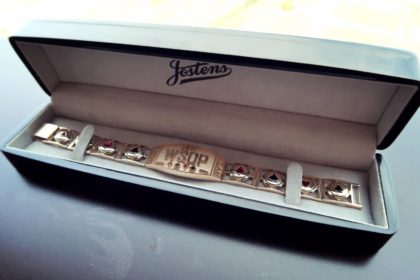2017 WSOP Tag Team Bracelet Sells for $10,200 on eBay, Proceeds Given to Charity
Last week, I bought something in an eBay auction for $30 and to be honest, I didn’t even want to spend that much, but it was the lowest price I could find on something I really wanted, and hey, I deserve joy in life. I would also very much like a World Series of Poker bracelet, but I have neither the poker skill nor five-figures of disposable income to purchase one on eBay. What I am implying with that statement is exactly what you are thinking: there was a WSOP bracelet sold on eBay last night. An auction by an eBay account associated with poker pro Liv Boeree ended Wednesday night, selling a 2017 WSOP bracelet for $10,200.
We have seen bracelets auctioned off on eBay in the past, but unlike those, this is not a situation where someone was desperate for money or had to pay a bunch of back taxes to the government. The bracelet was sold an eBay account owned by the charitable organization, Raising for Effective Giving (REG), co-founded by poker pros Liv Boeree, Philipp Gruissem, Igor Kurganov, and Stefan Huber.

Liv Boeree and Igor Kurganov Won the 2017 WSOP $10K Tag Team Event
Photo credit: WSOP.com/Joe Giron
Boeree and Kurganov, who are dating, won the $10,000 Tag Team event early on in the 2017 WSOP, the first bracelet earned by both players. The bracelet from the auction, though, did not actually belong to either of them, even though they were the ones who listed it for sale. It was actually a fortunate quirk of this specific event that allowed the auction to even be created. Teams for the tournament were composed of two to four players; because Boeree and Kurganov were only a duo, there were two bracelets left over, as the WSOP had to have four available. The WSOP donated one of those extra bracelets to REG for the auction.
So don’t worry, neither Liv Boeree nor Igor Kurganov is busto. The two even donated half of their $273,964 first prize to REG. Knowing they would be doing that if they cashed, Kurganov even said in his interview afterward that REG was “basically our third and fourth player.”
Raising for Effective Giving is not a traditional charity in that it is not the organization that specifically puts donations to work. Instead, it allocates contributions to several charities which it has vetted. It is a mutual fund of charities, of sorts.
It is more than that, though. The idea for REG was developed by the Effective Altruism Foundation (EAF), which pays administrative expensive for REG, selects the charities, and allocates funds to those charities. The way EAF and REG go about their charitable donations is different than most, though.
REG focuses on cost effectiveness for its donation targets. As the organization explains, most of us usually select charities for any number of reasons, though very often it is because the cause is meaningful to us. My wife, for example, wrote a children’s book and donates half of her proceeds to the American Cancer Society because her father passed away from pancreatic cancer. Some people research charities and pick ones whose administrative costs are low, others donate because someone came to their door. We have lots of reasons for donating and almost all of them are quite valid.
What REG does is look for charities that are extremely cost effective, where money donated goes a long way and helps the most people, regardless of what the mission of the charity actually is. To hear REG say it on its website:
….it is odd that explicit cost-effectiveness is a comparatively rare criterion for people when selecting charities to donate to. Cost-effectiveness in general is the output you get for a given input. In charity, it is the amount of people helped per unit of money donated. If your reason for donating is at least in part that you want to help others for their own sake, and if you prefer to help more people rather than fewer people, then you should have a strong interest in the cost-effectiviness of charities.
The explanation continues later on the same page: “….a strong focus on effectiveness implies a cause neutral approach where interventions of any sort could end up being the best. By dogmatically limiting oneself to only specific causes, one is potentially ignoring interventions that could have a much higher impact.”
Essentially, when deciding between two charities, one where a dollar can help one person and one where a dollar can help five people, REG will choose the latter. The area of assistance is not necessarily of the greatest importance.
Right now, REG supports charities that fall into three buckets: poverty alleviation, animal welfare, and risks from emerging technologies. The charities are:
– Against Malaria Foundation
– Schistosomiasis Control Initiative
– Animal Charity Evaluators
– Animal Ethics
– Humane Slaughter Association
– Foundational Research Institute
– Machine Intelligence Research Institute
REG also specifically targets poker players, encouraging them to pledge two percent of their “gross poker cashes.” Donations can be made to the group of charities as a whole, to be distributed as REG deems appropriate, or to one of the specific charities on the site.



















COMMENTS